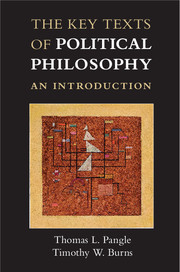Book contents
- Frontmatter
- Dedication
- Contents
- Acknowledgments
- Introduction
- Part I Classical Political Philosophy
- Part II Biblical Political Theology
- Part III Modern Political Philosophy
- Part IV Modernity in Question
- 11 Rousseau’s First and Second Discourses
- 12 Marx and Engels: The Communist Manifesto
- 13 Tocqueville’s Democracy in America
- 14 Nietzsche and His Zarathustra
- Name Index
- Subject Index
- References
14 - Nietzsche and His Zarathustra
Published online by Cambridge University Press: 05 October 2014
- Frontmatter
- Dedication
- Contents
- Acknowledgments
- Introduction
- Part I Classical Political Philosophy
- Part II Biblical Political Theology
- Part III Modern Political Philosophy
- Part IV Modernity in Question
- 11 Rousseau’s First and Second Discourses
- 12 Marx and Engels: The Communist Manifesto
- 13 Tocqueville’s Democracy in America
- 14 Nietzsche and His Zarathustra
- Name Index
- Subject Index
- References
Summary
Friedrich Nietzsche (1844–1900) placed the whole tradition of political philosophy, founded by Socrates, in doubt. Prior to Nietzsche, the enterprise that Socrates started had been carried on for 2,500 years – by philosophers who disagreed with Socrates, on many fundamental points, and who of course disagreed with one another; but all their controversies proceeded on the basis of a fundamental consensus: Namely, that it is possible and necessary to make progress in discovering universal and abiding, rational standards of justice and of the good life. These standards were understood to be derivable either from insight into the permanently deepest needs of human nature, or from insight into the historical process through which humanity grows into completion. Nietzsche was the first philosopher to call radically into question this plane of agreement, and therewith the whole undertaking based on this plane.
The impact of Nietzsche’s questioning has been devastating. In his wake, the preeminent philosophic thinkers in the twentieth century – Husserl, Bergson, Heidegger, Whitehead, Wittgenstein – abandoned or avoided political philosophy. In our time, political philosophy has largely been replaced by political “ideology,” that is, high-level propaganda: the elaboration of sophisticated intellectual defenses for a presupposed, and never radically questioned, set of normative principles called “our values.” The most influential and sophisticated political theorists – such as Hannah Arendt, John Rawls, Richard Rorty, or Jürgen Habermas – regard the original enterprise of political philosophy founded by Socrates, and continued through Marx, to be impossible. They are convinced that there is no knowable rational standard beyond or outside each historical culture on the basis of which one could independently judge between conflicting cultural “values.” All “value commitments” are ultimately relative to and products of their specific historical culture. No thinker, however wise and profound, can ever really escape his culture. All thinkers are “children of their time.” All past philosophers who believed themselves to be engaged in the Socratic project, who believed themselves to be making progress in discovering the universal and abiding norms of human nature or history, are detected to be victims of profound self-delusion. We today can claim to understand all of them better than any of them understood themselves.
- Type
- Chapter
- Information
- The Key Texts of Political PhilosophyAn Introduction, pp. 397 - 416Publisher: Cambridge University PressPrint publication year: 2014



